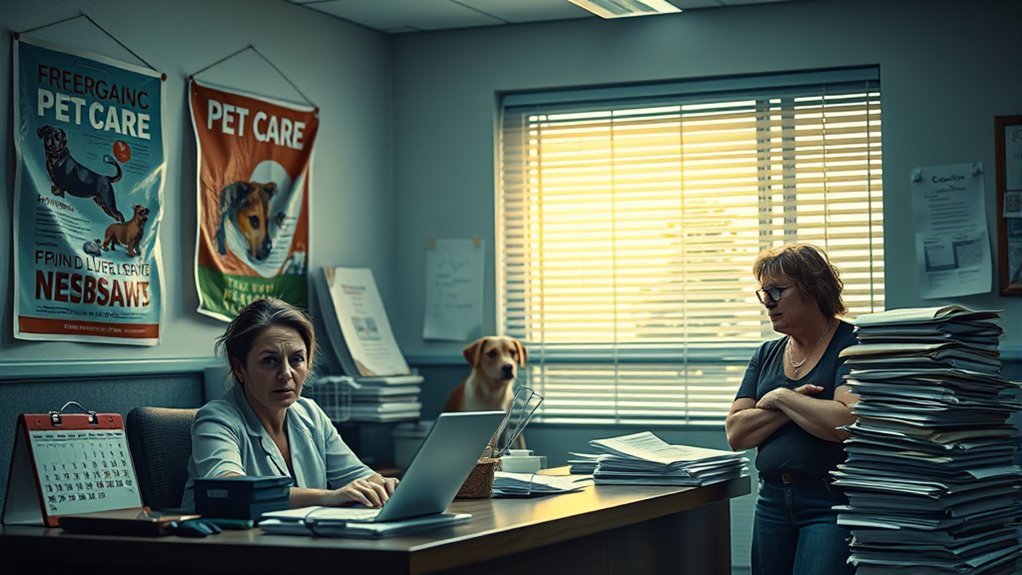10 Warning Signs You Need a New Vet
Finding the right vet for your pet is really important. But sometimes, things don't go as we hoped. If you see regular problems, like unclear communication or a dirty clinic, it might be time to think about a new vet.
If your appointments feel rushed or the staff seems uninterested, that can make you feel confused. Mixed messages about your pet's treatment can add to that confusion. It's crucial to notice these signs—your pet's health needs the best care.
Wondering what other signs to look out for? Here are some common warning signs that mean you might need to change vets.
Key Takeaways
Here are some signs that it might be time to find a new vet for your pet:
- If you can't understand what your vet is saying or they don't explain things clearly, it might be a good idea to look for a new one.
- If the clinic is dirty or messy, it can be a sign that they don't care about cleanliness and your pet's safety.
- If you feel rushed during your visits, the vet might have too many patients and not enough time for your pet.
- If the staff seems bored or uninterested, it can affect how well they take care of your pet.
- If you don't get follow-up care or unclear instructions about treatments, this can hurt your pet's health and shows that they might not care enough.
If you notice any of these problems, think about finding a new vet who will take better care of your furry friend!
Lack of Communication
Good communication with your vet is very important for your pet's health. If you feel like your vet isn't responding well or you have a hard time understanding what they say, that's a warning sign. You should always feel informed and confident about your pet's care.
A good vet will take the time to explain what's wrong with your pet and what treatments they need. This will help you ask questions and share any worries you may have. If your talks with your vet are short or leave you confused, pay attention to that.
Good communication creates trust and helps you feel like you're part of your pet's health journey. Look for a vet who encourages open conversations and teaches you how to care for your furry friend. Your pet deserves the best care possible, and you deserve to feel good about it!
Unclean Facilities
Cleanliness is very important in a veterinary clinic. You want a place that looks clean and safe for your pet. If you see a messy area, it might be time to think about finding a new vet.
Here are some things to look out for:
- Floors with dirt, fur, or spills
- Messy and chaotic exam rooms
- Untidy waiting areas and pet cages
If a vet's office looks unclean, it might mean they don't care enough about animals. You should feel good about where your pet is treated.
If something feels off, trust your gut. Look for a veterinarian who values cleanliness as much as you do. Your pet's health and happiness matter!
Rushed Appointments
If you feel like your vet rushes through appointments, it might be time to think about finding a new one.
Good vet care isn't just about getting you in and out quickly. It's important that you and your pet feel heard and cared for. Your vet should take the time to talk about your pet's health and answer your questions. If your vet seems to hurry and doesn't focus on your concerns, it can make you feel frustrated.
A great vet will explain what's going on with your pet and provide the care they need.
If you often feel rushed, it might mean your vet has too many patients to give you the attention you and your pet deserve.
Disinterested Staff
Your visit to the vet matters a lot. It's not just about the doctor; the entire staff is also important for your pet's care. If the staff appears disinterested, it can make you worry about your pet's health. A caring team creates a friendly place, which makes you feel better about your visit.
Here are some signs to watch for:
- The staff doesn't talk much about your pet's needs.
- They don't want to answer your questions.
- The vibe feels uncaring or uninterested.
A good staff should care about you and your pet. They should show interest in helping your furry friend stay healthy.
If you notice disinterest, you might want to find a vet where both you and your pet feel appreciated. Your pet deserves a team that truly cares.
Inconsistent Recommendations
When you get mixed messages about your pet's care, it can feel confusing. If your vet keeps suggesting different treatments or protocols, that's a warning sign.
Conflicting information about vaccines, food, or medicine shows they might be unsure about the best care for your pet. This can make you wonder if your furry friend is getting the right help.
It's important to have a vet who gives clear and steady advice. This helps you trust them more and ensures your pet is happy and healthy.
If the advice you get doesn't match what other vets say or doesn't feel right, you might want to find a new vet. Look for someone who communicates well and provides consistent care for your beloved pet.
Poor Follow-Up Care
Your vet needs to take care of your pet during visits, but follow-up care is just as important.
If your vet doesn't check in after treatment, you might worry about your pet's recovery.
Here are a few signs that your vet could do better with follow-up care:
- They don't call or message you after treatment.
- They don't tell you what signs to watch for during recovery.
- Their instructions for ongoing care aren't clear.
Your pet deserves a vet who cares even after the appointment is over.
If you notice these issues with your vet, it may be time to find someone who'll build a better partnership with you and your furry friend.
High Pressure for Unnecessary Procedures
If you often feel pushed into agreeing to tests or treatments for your pet that don't seem needed, this is a big warning sign. A good vet cares about your pet's health first. They shouldn't pressure you into expensive tests or procedures that may not help.
You should feel free to ask questions and share your worries with them. If the vet keeps insisting on more procedures without giving clear reasons, you might want to find a new vet. Trust your gut; you know your pet best.
Look for a vet that shares your values and focuses on what your pet needs, not just making money.
Dismissive Attitude Toward Concerns
A dismissive attitude from your vet is a big red flag. When you take your pet to the vet, you want someone who cares about your worries. If your vet often ignores your questions or makes you feel like you're overreacting, it can cause trust issues.
Here are some signs to watch for:
- They don't pay attention to what you say about your pet's health.
- They seem impatient when you ask questions.
- They make you feel silly for being worried.
Your pet deserves a vet who listens and respects what you think. Trust your feelings; if your vet isn't treating you and your pet with care, it may be time to look for a new one.
Negative Online Reviews
Negative online reviews can tell you a lot about your vet's care. If you see the same problems in different reviews, it's a good idea to pay attention. These reviews show what other pet owners experienced. They can help you see if the vet is trustworthy and skilled.
Look for the reasons people are unhappy. Do they mention poor communication, long wait times, or bad treatment? These could mean there are bigger issues.
Every business can get a bad review once in a while, but if you see many bad ones, that might be a sign of trouble.
If reading these reviews makes you feel worried about your vet, it could be time to find a new vet for your pet. Your furry friend deserves the best care!
Difficulty in Scheduling Appointments
Many pet owners face problems when trying to schedule appointments with their vets. If you find it hard to get an appointment or you always have to wait a long time, you might want to think about switching vets.
You might feel these things:
- Frustration when your pet needs help right away.
- Worry about missing regular check-ups.
- Helplessness if your vet can't see you when you need them.
A good vet should make it easy for you to book an appointment when you need it. They should be flexible and help you feel good about your pet's care.
If you often struggle with booking appointments or finding someone to talk to, it may be time to find a new vet. Don't let appointment problems risk your furry friend's health!
Frequently Asked Questions
How Often Should I Take My Pet to the Vet?
You should take your pet to the vet at least once a year for a check-up. This helps keep your pet healthy. If your pet has health problems, you may need to visit the vet more often. Regular visits let the vet check how your pet is doing and catch any issues early. Keeping your pet healthy is important for a happy life together!
What Are Common Signs of a Healthy Pet?
To keep your pet healthy, watch for some simple signs. A shiny coat is a good one. It shows your pet is well-nourished. A good appetite means they enjoy their food and are getting the nutrients they need. Regular energy levels are important too. If your pet is active and playful, that's a sign they're feeling good. Finally, make sure to check their heartbeat. A regular heartbeat means their heart is working well. These signs show your pet is happy and healthy!
How Can I Prepare for a Vet Visit?
To get ready for a vet visit, make a simple checklist. Write down your pet's symptoms, any medications they take, and any questions you want to ask the vet. This will help you remember everything during your appointment. You want to make sure you cover all the important points while you're there.
What Vaccinations Does My Pet Need Annually?
Your pet needs some important vaccines every year. These include rabies, distemper, and parvovirus. Don't forget to get their booster shots too! These shots help keep your furry friend safe and healthy. Regular visits to the vet are essential. They will check on your pet and make sure they are in great shape. Keeping your pet vaccinated is a simple way to show you care!
Can I Switch Vets While My Pet Is Undergoing Treatment?
Yes, you can change vets while your pet is getting treatment. Just make sure to give the new vet your pet's medical history. This way, they can continue the care your pet needs. Your pet deserves the best care, no matter where it comes from. Switching vets can help your furry friend get the right attention they need.




